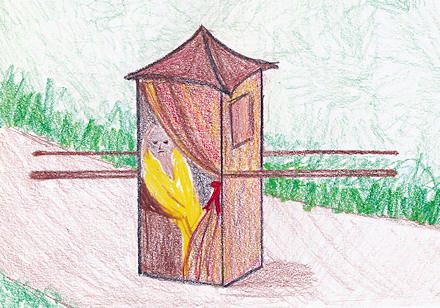
Devadatta remained in the chair.
Drawing by Tess B. Iverson, Sixth College (UCSD), Class of 2011, by permission
Devadatta now knew it was useless to try to kill the Buddha, but he still was determined to establish a new order of monks headed by himself. Once again he presented himself before the Buddha, as though nothing had happened.
He reported that many of the Buddha’s followers were not very ascetic. Compared with most of the mendicants of the land, the arhats and other bhikshus and lay followers seemed to live a life almost of luxury.
He asked the Buddha to issue sterner commandments to his followers: those who left the family should never sleep beneath a roof, but only in the open or under trees; they should eat nothing that was not received from begging; they should eat no meat and should wear only a patched cassock.
The Buddha declined these proposals. In each case he said that those who wished to practice such austerities were welcome to do so, but that those who did not wish to were also free not to. And then he added that in the future Devadatta was not to try to divide the followers, for to do so would bring bad consequences to him.
Devadatta did not heed this warning, and he continued to tell people that the followers of the Buddha were not real ascetics, and had no hope of learning how to avoid suffering because they did not practice appropriate austerities. Some believers were convinced by him, and he led them away to follow his teachings and to join his new order of monks, with Devadatta at his head.
When he learned this, the Buddha told his assistant Shariputra to go with them and explain the error of their ways. When Shariputra reached them at Devadatta’s monastery, Devadatta was having his mid-day nap inside while his followers rested on the ground outside. Shariputra addressed the monks, as the Buddha had told him to do, and they all returned with him, for Shariputra, like the Buddha himself, was very persuasive.

When Devadatta awoke from his nap, the place was unnaturally quiet, and when he went out to see why, he found that all of his bhikshus had disappeared. A bystander told him of Shariputra’s visit, and of the departure of all who had come with him from the encampment of the Buddha. Devadatta was furious.
Like the Buddha himself, Devadatta was no longer young. And unfortunately he was also not in good health.
But he was determined to confront the Buddha and demand the return of his “stolen” followers, so he ordered a sedan chair, and headed along the mountainous route to the Buddha’s encampment. Someone went ahead and warned the Buddha, but he was not perturbed. It was as though he knew what would happen.
Devadatta’s bearers stopped along the road to rest, and he remained in the chair. When they returned to him, he was dead. Some people say that he was not found at all because he was swallowed alive into hell.
This was the last time anyone tried to harm the Buddha or to split the movement. But what was going to happen when the Buddha grew old? Read Part VI to find out.